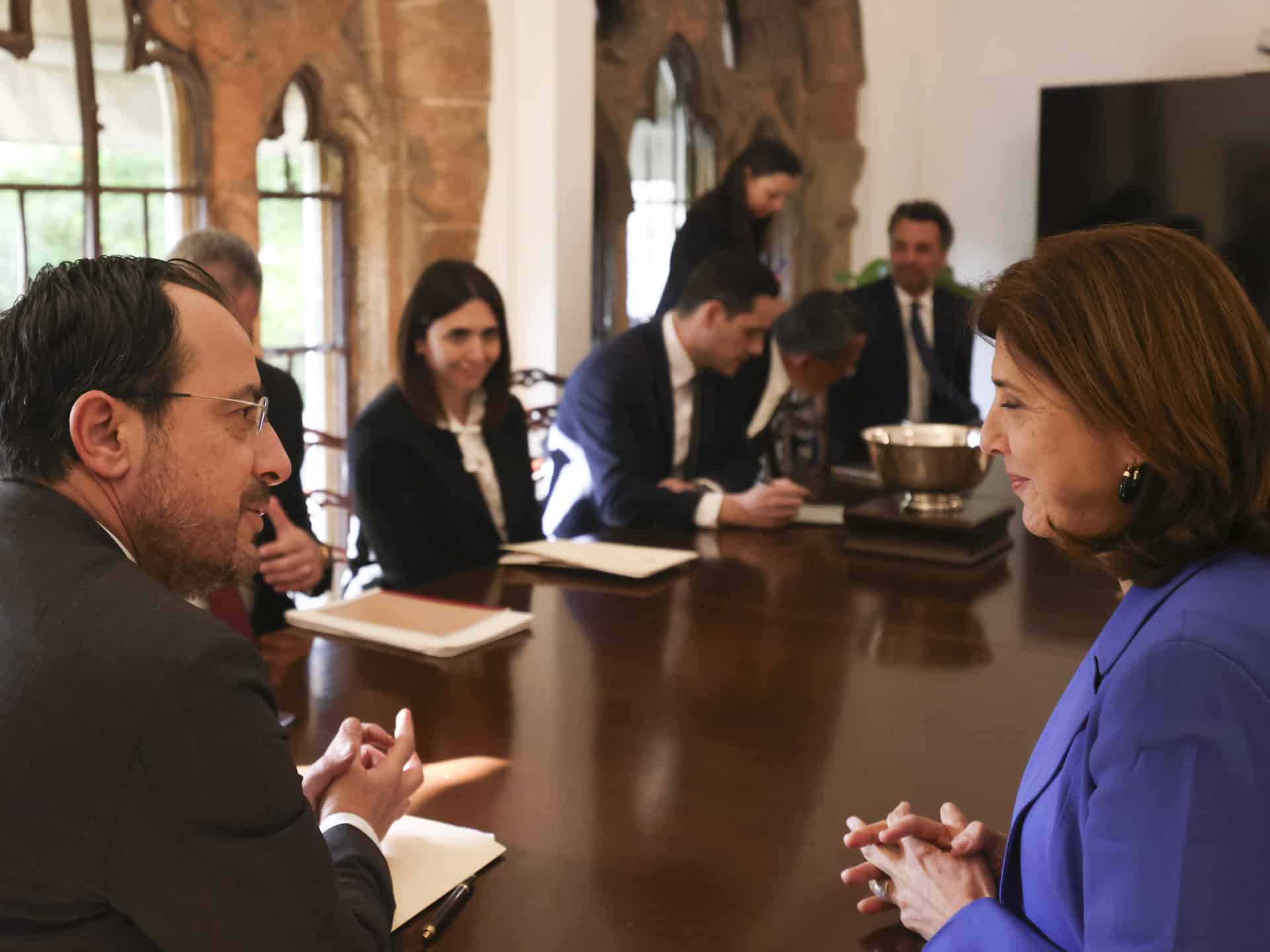The UN secretary-general’s personal envoy Maria Holguin said “a lot of ideas” had been raised at her meeting with President Nikos Christodoulides on Monday.
Holguin held the meeting as part of the second round of contacts she is holding on the island, in hopes of finding common ground to restart negotiations of the Cyprus problem.
Speaking to reporters after the meeting, she described it as “very good”.
She added, “this week is important for me because I will [also] meet the political parties, which are so important, the media, editors and journalists, and I think these will be very interesting meetings about the situation in Cyprus.”
She also mentioned her “very good meetings” in Ankara, Athens, and London, said she had informed the governments of Greece, Turkey, and the United Kingdom of her view of the situation.
Asked if there are any “positive signs” from her meetings so far, she said both sides are willing “to explore”, and that this is “a good thing”.
Christodoulides said Holguin had informed him about her contacts abroad and confirmed that he would hold another meeting with her.
Speaking after the meeting, Government Spokesman Konstantinos Letymbiotis said the government had conveyed its “readiness to resume negotiations as soon as possible”.
He added that “what matters is that we are bound by UN Security Council resolutions.”
He went on to say, “we knew from the first moment the difficulties and challenges we could face, but we are here in good faith and we insist on the resumption of negotiations under the agreed framework.”
He conceded that nothing concrete had yet come from the meetings, but that there had been an “exchange of views” and that “our own conviction, our own will, our proven and practical will for the resumption of negotiations is known.”
Additionally, he said there had been “no discussion” on a timetable for Holguin’s tenure in post, despite Turkish Cypriot Leader Ersin Tatar’s insistence on a six-month timetable.
Earlier, she had had a “productive meeting” with Ersin Tatar.
Speaking after meeting with Tatar, Holguin said she had a “very good meeting” with Tatar, and that she hoped the rest of her meetings this week with the chambers of commerce and civil society would be likewise.
“I hope can continue here, and continue to understand the issue, and think about it more as the Cyprus issue, than the Cyprus problem,” she said.
Following the meeting, UN Secretary General Antonio Guterres made a statement for the anniversary of Cyprus’ UN peacekeeping force (Unficyp).
“This opportunity is a milestone to reaffirm the unwavering commitment of the UN to both Greek Cypriots and Turkish Cypriots to work with them to find a mutually acceptable solution for all those on the island.”
Meanwhile after the meeting, Tatar reiterated his position on having sovereign equality and equal international standing for the Turkish Cypriot side in order to restart talks.
Tatar noted that the Republic of Cyprus, created in 1960 after the British left, was based on an agreement that allowed the two communities to live together while ensuring a balance between them.
However, according to him, the Greek Cypriot side “sought to dismantle this democracy, which bore federal characteristics”.
Criticising the UN decision in 1964 to recognise the Republic of Cyprus as the only legitimate government on the island, as well as what he described as Cyprus’ “unilateral” accession to the EU in 2004, Tatar claimed that “these decisions are unfair to Turkish Cypriots.”
Tatar insisted on the need for concrete steps towards sovereign equality before any resumption of talks. He said he was ready to consider new approaches on this basis with the UN secretary-general envoy.
Later on Monday, Holguin met with Turkish Cypriot Nicosia Mayor Mehmet Harmanci.
He informed her of his plans for urban development in northern Nicosia, which he hopes will “create bicommunal trust and partnership” and plans to “rehabilitate” the Pedieos river with a park which stretches across both sides of the divided capital city.
Meanwhile, Foreign Minister Constantinos Kombos stressed that any discussion over common ground with the Turkish Cypriot side would not stray outside of the UN framework, regardless of intractable statements by the other side.
He added he had discussed the issue at length with president of the European Commission Ursula von der Leyen, and that following Holguin’s other contacts, including in Brussels, he hoped there would soon be “positive developments”.







Click here to change your cookie preferences